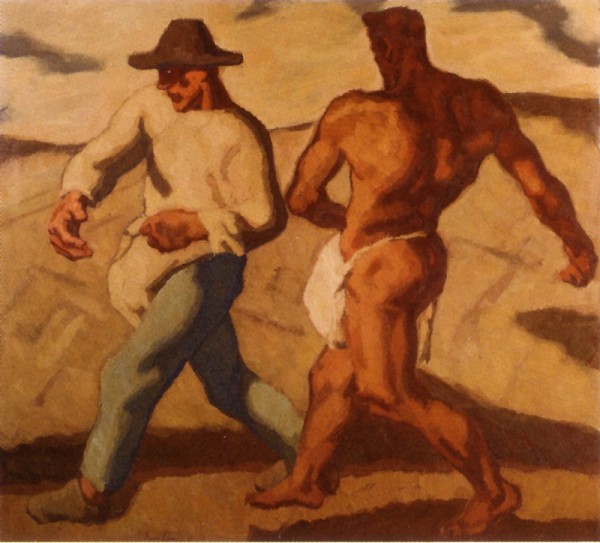 The question about evil opens this hour of Morgan Freeman’s peripatetic exploration of religious cultures. Within the question is a plaintive note, but he changes that to umbrage by rephrasing it: why should evil exist at all, if the world is under divine control?
The question about evil opens this hour of Morgan Freeman’s peripatetic exploration of religious cultures. Within the question is a plaintive note, but he changes that to umbrage by rephrasing it: why should evil exist at all, if the world is under divine control?
A man who seemingly can’t sit still, Freeman travels more than Rick Steves, PBS’ longtime travel guy, who never tries to fit six continents into one hour. But for all the frequent flier miles, Freeman doesn’t come up with an answer to his question about evil and the divine.
Evil is never a comfortable thought, and Freeman’s inability to sit still and reflect on it is understandable. Yet he acknowledges from the start how agonizingly long evil’s tenure on earth is, using images of the Ku Klux Klan, lynchings, and the dire poverty of thin black Americans clad in tattered clothes and no shoes in the 1920s and 1930s.
Freeman asks us and perhaps God as well, if evil comes from an external force – a devil or demons – or from inside us. This question lingers, unanswered, through the hour. The brunt of his exploration is personal, individual stories, which perhaps is an indication of the direction of his answer, but he never says so directly.
He spends time with a neuroscientist who is studying the brains of psychopaths in a maximum security prison. A man who has raped more than two dozen women and murdered five of them, and who has been in that prison for thirty years, says if let out he would commit more crimes because he has no empathy for his victims and no ability to stop himself when he has the freedom to follow his urges. Was he born this way? Or is his violence and his lack of emotional empathy a result of trauma? The data leans toward fetal misdevelopment in his brain. A measurable percentage of humans, mostly men, have this brain pattern.
Freeman does not pursue any possible connection between the behavior of this one loner and the behavior of groups, like the KKK. I wondered what neuroscience would say about groups of people being drawn into evil, how that happens and what it says about us.
Nor does Freeman delve into the long lasting effects on society of experiences of terrible evil. How has evil changed Jewish identity since WW2? How does the memory of segregation shape African American identity today? What about police shootings in the last few years, how is that shaping American identity, black and white?
Instead, Freeman travels to Luxor Egypt, and then to India, to explore legendary understandings of evil. Christians and Jews share a creation story in which a capacity for evil is inherent in people. And Freeman asks, what about genetics?
In India he discovers exorcisms, available to address the common belief that the source of evil is unhappiness in the souls of the ancestors. In Zoroastrian thought, he finds a continual mental struggle to defeat evil.
And in New Zealand he finds a psychologist studying the effect of belief in supernatural beings on children, who, when they are told that a being is watching them, do not cheat in order to get a prize, but when they thought they were alone, they did. But such a minor test bears no relation to the evil acts of a psychopath, nor to evil groups like the KKK can do, and the minor cheating of the kids seems to be manipulative but not truly evil, nor is there any reason to think their cheating will turn into true evil.
The longest segment of the hour was Freeman talking to a reformed neo-Nazi skinhead, who for 16 years did terrible things as part of a group of skinhead group whose identity was much like the KKK. The man had an epiphany when he married and his wife became pregnant. He found God. And then he realized there is good and evil in us all. He changed his life, spending years getting face and neck tattoos removed, he went to church and transformed his hatred into compassion.
Again, Freeman declines to explore this story of personal transformation, and whether it might be applicable for groups, and how it might be promoted. Was there nothing anyone could have done to bring such a transformation about in this man, and is there no hope for other skinheads, other than to hope for pregnancy and epiphanies to transform them?
Freeman opines at the end of the hour that without evil, we would not develop our ability to express kindness, mercy, and forgiveness, or to do good in a cruel world.
American culture is obsessed by evil at present, seeking to destroying evildoers, throw out illegal immigrants, execute killers, get revenge. We yearn for superheroes.
I think Freeman shies away from such punishments as forms of deliverance, but I am unclear what he wants to do about evil. And I am perplexed, rather than persuaded, by his claim that evil develops our ability to do good.
Jesus never threw away anyone, that is clear. All of us are redeemable in his sight. Yet he does not do good because of evil, but despite it, and in the midst of it, and overcomes it with love.
Somehow Freeman missed this. The hour ended with its questions still hanging.
______________________________________________________________________________________________
Image: The Sower and the Devil, 1921, by Egger-Lienz, Albin. Vanderbilt Divinity School Library, Art in the Christian Tradition.










